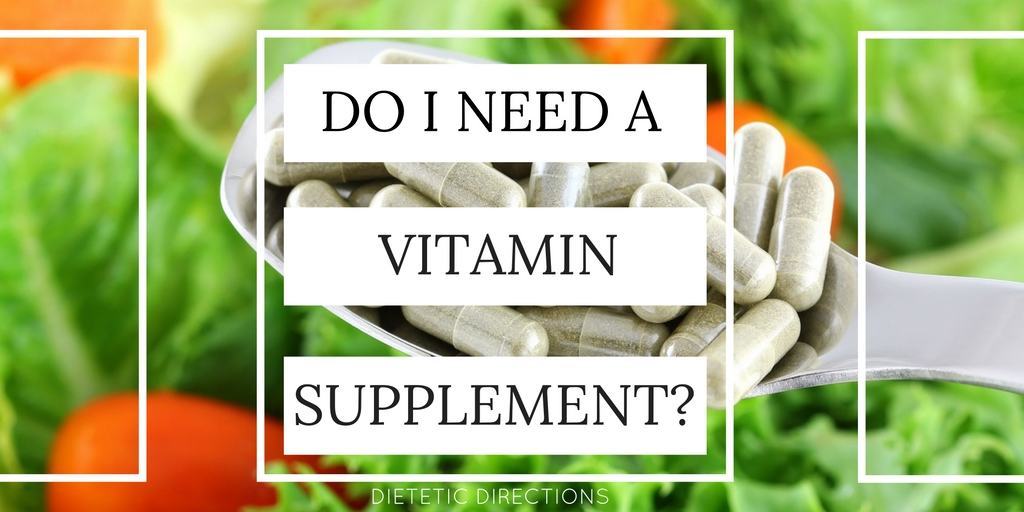
Do I need a vitamin supplement?
Have you even wondered if you should be taking a vitamin or mineral supplement? Perhaps you reflected on your diet, scratched your head and thought “am I missing something?”
The prevalence of supplement use is estimated at 40% among adults (Canadian Community Health Survey 2.2). As a dietitian, I like to take a food-first approach in meeting needs; however, I also recognize the necessity of bridging nutrient gaps.
A common myth is that by taking a supplement we can make up for an unhealthy diet. Not true! Similarly, people may assume that taking a supplements is as beneficial as getting this vitamin through food; also not true. Choosing nutrient rich foods provides more than just one vitamin, but instead a compilation of numerous nutrients with different health benefits. For example, if you choose to eat more beans, lentils and chickpeas (because it is the International Year of Pulses); you would get a lot more than just extra iron, you would get potassium, magnesium, zinc, folate, protein and loads of fibre to name a few! Think of foods as a matrix of different nutrients that can promote health.
Today, let’s dive into the fascinating world of supplements and discuss where they fit and precautions before popping any extra pills.
Do I Need a Multivitamin?
This is a popular question. According to Health Canada, many Canadians get too little calcium, magnesium, potassium, vitamin A and D and fibre. Multivitamins are commonly purchased as a “dietary insurance” when people feel they are simply not getting “enough”. However, multivitamins are not a good source of magnesium, potassium or fibre. Therefore, instead of reaching for a multivitamin, focus on consuming “nutrient-rich” foods to boost these nutrient intakes. Here’s how you can boost your magnesium and potassium in your diet. Multivitamins do not appear to be harmful; however, they may provide false “dietary insurance”.
Vitamins Commonly Lacking:
Vitamin D:
It is a good idea to take a vitamin D supplement. Canadians often need to take a vitamin D supplement since our bodies cannot make enough of this nutrient during winter and if sun exposure is limited. Vitamin D helps with bone and muscle strength, and may reduce the risk of diabetes, fall and breast and colorectal cancer.
Sun exposure, skin colour, obesity, age and diet all have an impact on vitamin D requirements. Canadian Cancer Society recommends adults take 1000 IU of vitamin D daily to maintain adequate stores.
Vitamin B12 & Iron:
Vitamin B12 and iron impact the blood cells and energy levels. Both of these are associated with different forms of anemia and low levels can be caused by either inadequate dietary intake or a decrease in your body’s absorption.
Vegans and vegetarians are at risk for vitamin B12 and iron deficiency because plant foods do not contain B12 and the iron in plant food is not as readily absorbed. Vegetarians have almost double the iron requirements of a non-vegetarians. Ask your doctor to monitor your blood levels and speak to your dietitian to ensure you are meeting your needs if you are following a restricted diet.
Other groups at risk for low iron status include: infants and children, premenopausal and pregnant women. If you frequently donate blood or have a heavier menstrual flow your iron needs will be higher. Elderly are at risk of B12 deficiency because absorption decreases with age. Health Canada recommends that Canadians over 50 consume foods fortified with vitamin B12 or a supplement containing vitamin B12.
Folic Acid:
Health Canada recommends all women who could become pregnant take a multivitamin containing 400 μg (0.4 mg) of folic acid every day to help prevent neural tube defects. Also, be sure to include foods rich in folate in your diet such as leafy veggies, fruit, beans and fortified grains.
Magnesium:
The majority of the population of all ages get too little magnesium in their diet. Inadequate intakes may increase risk of heart disease, diabetes, colon cancer and osteoporosis. Dietary sources include foods like: nuts and seeds, beans and lentils, leafy greens and whole grains. Dietary recommendations are 320 mg a day of magnesium for women and 420mg daily for men. If you’re your diet is inadequate, taking a supplement can help you meet your requirements; however, taking doses above 350mg a day may cause diarrhea.
DYK: the majority of the population of all ages get too little magnesium in their diet Share on XOmega 3:
Choosing foods that are rich in omega-3 fats (e.g. fatty fish like salmon, herring, mackerel, sardines) helps to lower the risk of heart disease and Type 2 diabetes. If you have a difficult time meeting omega 3 requirements, you may consider taking a supplement. If you have certain health conditions, like high triglycerides (fat in blood), omega 3 supplements are also found to be helpful. Speak to your dietitian for dosing since this will depend on your diet and health conditions.
Too much of a good thing?
Before popping extra supplements, be aware that taking large amounts of vitamin or mineral supplements can be dangerous to your health. For many nutrient supplements, there are safe upper limits set. There are also possibilities for drug interactions. For example, if you are taking a blood thinner (like Coumadin), too much vitamin K interferes with this medication thinning the blood. Similarly, vitamins C and E supplements might reduce the effectiveness of some types of cancer chemotherapy. I recommend clients speak with their family doctor or Pharmacist about any supplements they are taking before starting a new medication.
Bottom Line:
It is crucial to aim to achieve a nutritionally balanced diet to meet your nutrition needs for health and vitality. Think of supplements as a way to bridge the gaps where needed. If you are concerned about meeting your nutrient needs, speak with a registered dietitian who can complete a comprehensive dietary review and determine if you require a vitamin or mineral supplement.
Enjoy delicious (and nutritious) foods and take your vitamins as needed!




